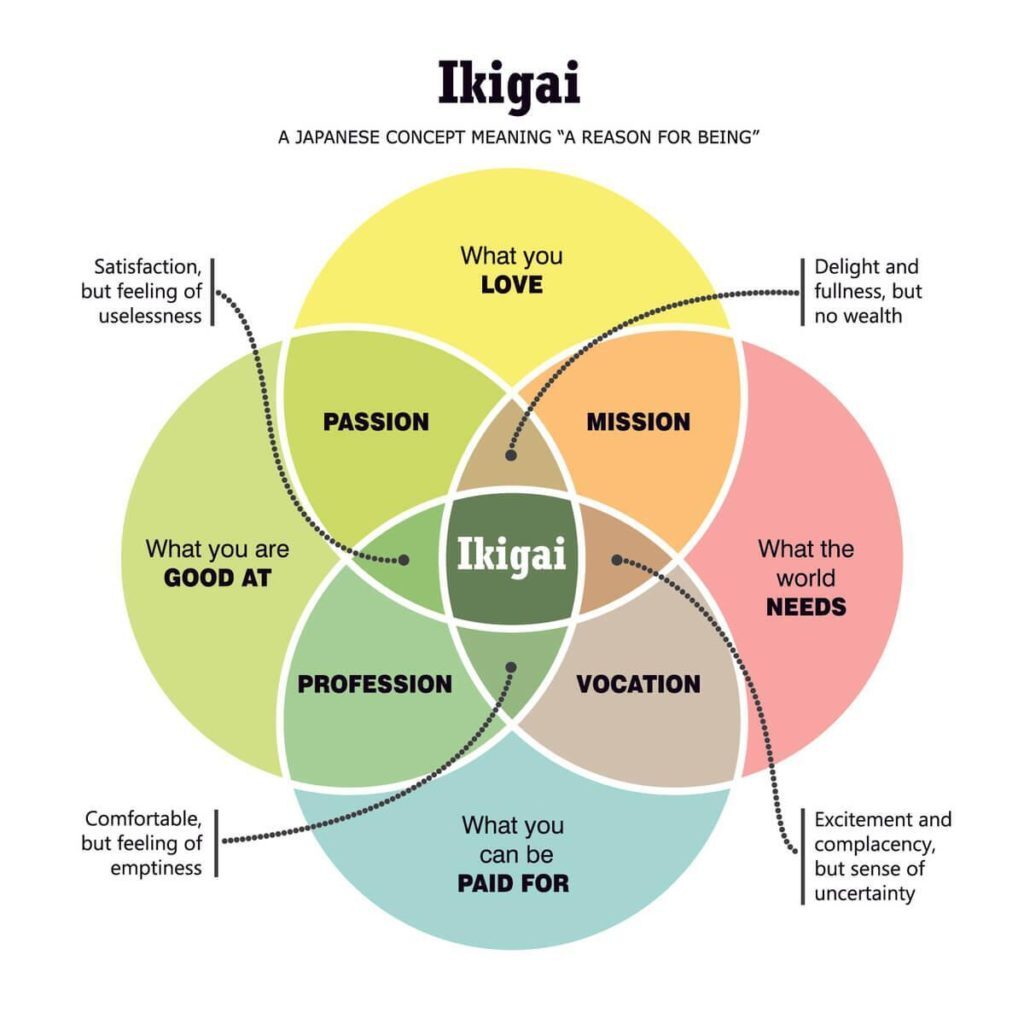Finding Your Ikigai: Discovering Your Purpose in Life
What gets you out of bed in the morning?
For many, the alarm clock is a dreadful sound, only hitting the snooze button to eke out a few more minutes of precious sleep. But others pop out of bed, energized by the day ahead. What causes this stark difference in how people greet the day?
Often, it comes down to finding your ikigai.
Ikigai is a Japanese concept that combines satisfaction, meaning, and purpose into one tenet. In Japanese, iki means “life,” and gai means “realization.” Finding your ikigai is akin to finding your purpose, the thing that makes you excited to tackle each new day.
Ikigai provides a framework for crafting a life well-lived by focusing on four elements:
- What you love (your passions)
- What you’re good at (your talents)
- What you can get paid for (converting talent into a career)
- What the world needs (meeting a demand and serving others)
At the intersection of these four components is where you’ll discover your ikigai. Figuring out this Venn diagram is a deeply personal, lifelong process of self-exploration. Here’s how to unpack each area in your search for ikigai.

Passion: What Sets Your Heart on Fire?
Passion provides the fuel, drive and excitement for pursuing your ikigai. Start by reflecting on times when you feel energized and absorbed in an activity. Make a list of your hobbies, favorite subjects in school, causes you care about, and anything that gives you a sense of joy and enthusiasm.
Getting curious about what draws you in can provide clues. For example, are you captivated by the process or final result? Does solving puzzles scratch your itch or is it expressing creativity? Are you fired up by athletic challenges or connecting with people? Don’t overthink it – write down anything that sparks curiosity or passion.
Talent: What Are You Naturally Good At?
Now shift your reflection inward to uncover innate talents. What skills and subjects came easily when you were younger? What do people compliment you on today? What feels effortless even if you’re out of practice? Common talent areas include math, writing, music, athletics, cooking, public speaking, design, and relating to people.
Sometimes our talents hide in plain sight. We mislabel them as hobbies or downplay our abilities. Make a list of anything you excel at without much practice along with skills you’ve cultivated over decades. They all offer clues about your natural strengths.
Purpose: How Can You Add Value?
After identifying your passions and talents, the next layer is determining how those gifts can be shared with the world. How could expressing your talents help or serve others in some way? Your purpose goes beyond just making yourself happy – you also want to bring value to people’s lives.
For example, if you love animals and are skilled at training dogs, purpose areas could include training service dogs for people with disabilities, developing a doggie manners business to improve pet and owner relationships, creating online courses to share your knowledge virtually, or writing books on dog psychology and behavior.
Livelihood: Can You Earn Income From Your Purpose?
The final square to complete is determining how your passion and talent overlaps can generate income. This may require additional education, certifications, business planning, marketing, persistence and grit.
Going back to dog training, you may need to become a certified trainer before opening a dog obedience business. Or if writing is your talent, you’ll need to sharpen your skills, build an audience and monetize through advertising, products or services. Identifying your livelihood potential ensures your ikigai aligns with career options you can pursue.
Key Tips for Finding Your Ikigai
Searching for your ikigai is an ongoing process versus reaching a finite destination. Here are some guidelines as you explore the intersections of passion, talent, purpose and livelihood:
- Don’t worry about finding your one true purpose. Ikigai can evolve over your lifetime as you grow and change.
- Enjoy the journey of self-discovery versus fixating on the end result. Savor exploring new interests that enliven you.
- Broadly sample activities that spark your curiosity to uncover hidden passions. You many not discover a love for painting, coding, or sailing until you try it.
- Look for ways your natural skills can help others versus only selfish interests. Research shows altruism and contributing value is linked to happiness and life satisfaction.
- Take minimal viable steps to build momentum versus overwhelming yourself. Transforming your passion into a lifestyle or income won’t happen overnight.
- Expect obstacles, rejection and challenges on your quest. Developing resilience, grit and a growth mindset will support you in staying the course when things get difficult.
While ikigai won’t be uncovered overnight, persistently practicing self-reflection, pursuing growth through challenge and finding joy in helping others will organically reveal your purpose. Listening to your inner voice and taking small daily steps to nurture your interests, skills and purpose will guide you toward ikigai.










